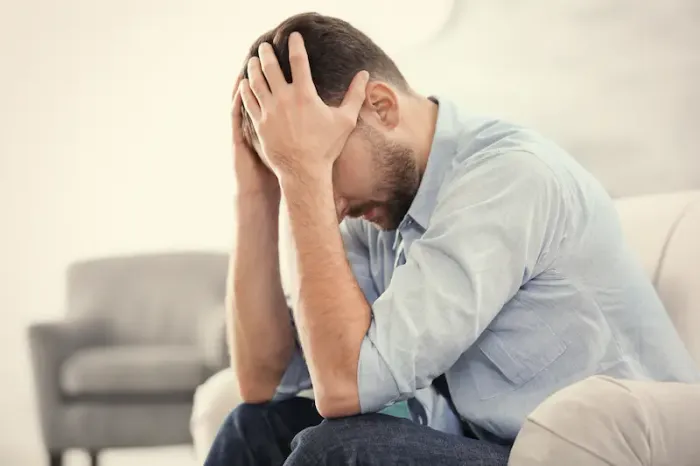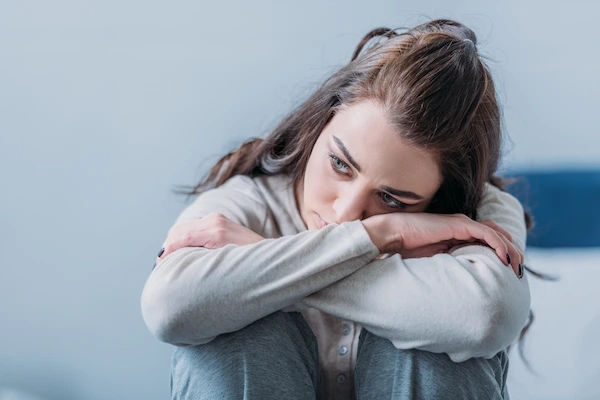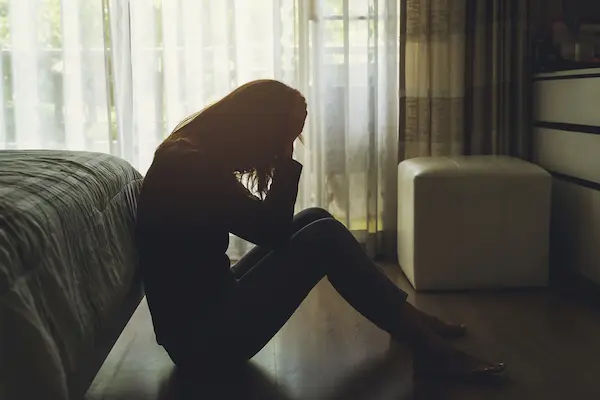Are You Depressed? A Guide to Understanding "Big D" and Finding Your Way Back
Discover what “Big D” (clinical depression) really means, how to recognise its symptoms, what causes it, and the treatment options that can help you or a loved one find healing.

Written by Dr. M L Ezhilarasan
Reviewed by Dr. D Bhanu Prakash MBBS, AFIH, Advanced certificate in critical care medicine, Fellowship in critical care medicine
Last updated on 13th Jan, 2026

Introduction
That feeling of a heavy weight on your chest, the fog that makes every task feel immense, the loss of joy in things you once loved—this isn't just a bad day or a case of the blues. This might be what many call "Big D": clinical depression. It's a common but serious medical illness that negatively affects how you feel, the way you think, and how you act. Contrary to popular belief, depression isn't a sign of weakness or a character flaw; it's a complex health condition with real, tangible causes. This guide will walk you through everything you need to know, from recognising the often-misunderstood symptoms of clinical depression to understanding treatment options and finding a path towards light. You are not alone in this, and understanding is the first big step towards healing.
What is "Big D"? More Than Just Sadness
Clinical depression, or Major Depressive Disorder (MDD), is a severe mental health condition that goes far beyond temporary emotional responses to life’s challenges. It's a persistent state that can last for weeks, months, or even years if left untreated, significantly interfering with daily functioning.
Clinical Depression vs. Everyday Blues: Knowing the Difference
Everyone feels sad, lonely, or low occasionally. These feelings are typically reactions to a specific event—a disagreement, a stressful day, or disappointing news—and they usually pass within a few days. Clinical depression is different. The sadness is pervasive and persistent, often lasting for at least two weeks. It’s not necessarily tied to an external cause; a person can feel deeply depressed even when everything in their life seems fine on the surface. The key differentiator is the intensity, duration, and the sheer number of symptoms that impair one's life.
The Many Faces of Depression: Types You Should Know
Depression isn't a one-size-fits-all diagnosis. Understanding the types of major depressive disorder can help in recognising its patterns:
• Major Depressive Disorder (MDD): The most common form, characterised by a combination of symptoms that interfere with the ability to work, sleep, study, eat, and enjoy life.
• Persistent Depressive Disorder (Dysthymia): A chronic form of depression where a person's mood is regularly low for at least two years.
• Postpartum Depression: A severe, long-lasting form of depression experienced by some women after childbirth.
• Seasonal Affective Disorder (SAD): Depression that occurs at a specific time of year, usually in winter when there's less natural sunlight.
The Signs and Symptoms: Listening to Your Mind and Body
Depression manifests in a myriad of ways, affecting every part of a person. It's crucial to look for a cluster of these symptoms, not just one or two.Consult a Psychologist for Personalised Advice
Emotional and Cognitive Symptoms
The emotional toll is often the most recognisable. This includes:
• A persistent sad, anxious, or "empty" mood.
• Feelings of hopelessness, pessimism, or guilt.
• Loss of interest or pleasure in hobbies and activities once enjoyed (a symptom known as anhedonia).
• Irritability, restlessness, and frustration over small matters.
• Difficulty concentrating, remembering details, and making decisions.
Physical Symptoms You Might Not Expect
Many are surprised to learn that depression has physical symptoms. It's not "all in your head." Your body feels it too:
• Significant changes in appetite and weight (loss or gain).
• Fatigue, decreased energy, and a feeling of being "slowed down."
• Sleep disturbances: insomnia (difficulty falling or staying asleep) or hypersomnia (sleeping too much).
• Unexplained aches and pains, headaches, cramps, or digestive problems that do not ease even with treatment.
What Causes Depression? It's Not Just One "Big" Thing
There is no single cause for major depressive disorder. Research suggests it's a complex interplay of genetic, biological, environmental, and psychological factors.
The Brain Chemistry and Biology of Depression
Depression has been linked to an imbalance of neurotransmitters, the chemicals in the brain that help regulate mood (like serotonin, noradrenaline, and dopamine). Brain imaging studies show that the brains of people with depression look different from those without, particularly in areas that regulate mood, thinking, sleep, appetite, and behaviour. There is also a hereditary component; MDD can run in families.
Environmental Triggers and Psychological Factors
Traumatic events, the loss of a loved one, a difficult relationship, financial problems, or any stressful situation can trigger a depressive episode in someone who is already predisposed to the illness. Personality traits, such as low self-esteem or being overly self-critical, can also increase vulnerability. This leads us to an important modern concept in mental health.
"Big T" vs. "Little t": How Trauma Influences Depression
A crucial framework for understanding depression's roots is the concept of trauma. "Big T" Traumas are events that are overtly and objectively life-threatening, such as natural disasters, serious accidents, or physical assault. "Little t" traumas are more common, subjective experiences that overwhelm our coping capacity, like chronic stress, emotional neglect, or a humiliating experience. Both types can fundamentally rewire the brain's stress response system, significantly increasing the risk of developing depression and anxiety together. Cumulative "little t" traumas can be just as impactful as a single "Big T" event in leading to a depressive disorder.
How is Depression Diagnosed? The Path to Clarity
Getting a formal diagnosis is a critical step towards effective treatment.
Talking to a Doctor: What to Expect
If you suspect you have depression, the best first step is to consult a healthcare professional. They will likely:
• Conduct a physical exam to rule out other medical conditions that can mimic depression (e.g., thyroid problems, vitamin deficiencies).
• Perform a lab test; for instance, Apollo24|7 offers convenient home collection for tests like vitamin D or thyroid panels, which can help rule out physiological causes.
• Conduct a detailed psychiatric interview, asking about your thoughts, feelings, and behaviour patterns.
The Role of Screening Questionnaires
Doctors often use standardised tools like the Patient Health Questionnaire (PHQ-9) to assess the severity of depression. This nine-item questionnaire is a reliable way to screen for the presence and severity of depressive symptoms.
Treatment Options: A Multifaceted Approach to Healing
The good news is that depression is highly treatable. Between 80% and 90% of people eventually respond well to treatment.
Psychotherapy: Talking It Through
Psychotherapy, or "talk therapy," is often a first-line treatment. Cognitive Behavioural Therapy (CBT) is particularly effective. It helps patients identify and change negative thought patterns and behaviours that contribute to their depression. Other forms, like interpersonal therapy (IPT), are also widely used.
Medication: Balancing Brain Chemistry
Antidepressants are medications that can help modify brain chemistry. They are not sedatives or "happy pills." They work gradually and must be taken under the supervision of a doctor. It’s important to note that finding the right medication and dosage can take time. If your condition does not improve after trying initial methods, consult a doctor online with Apollo24|7 to discuss medication options and adjustments.
Lifestyle Changes and Holistic Approaches
Lifestyle modifications support formal treatment:
• Regular Exercise: Boosts endorphins and stimulates serotonin.
• Healthy Diet: Nutrient-rich foods support brain health.
• Quality Sleep: Prioritising sleep hygiene is crucial.
• Mindfulness and Meditation: Can help reduce rumination and stress.
How to Support Someone with Depression
Supporting a loved one with depression requires patience and understanding.
• Offer emotional support with empathy and without judgment. Just listen.
• Encourage them to seek treatment and offer to help make the first appointment.
• Be patient. Recovery takes time. Don’t tell them to "snap out of it."
• Take care of yourself to avoid burnout.
Conclusion
Understanding "Big D"—clinical depression—is the first and most significant step towards reclaiming your life. It's a real, complex, but treatable medical condition, not a personal failing. From recognising the physical symptoms you might not expect to exploring the various types of major depressive disorder and their treatments, knowledge empowers you to seek the help you deserve. Remember, healing is not a linear journey, but it is a possible one. You would not ignore a big physical wound; please afford your mental health the same urgency and care. If the information here resonates with you, take that courageous next step and reach out to a mental health professional today.Consult a Psychologist for Personalised Advice
Consult a Psychologist for Personalised Advice

Ms Rajashree Navthale
Psychotherapy & Counselling (ASM)
8 Years • MA in Counselling & Psychotherapy, PG Diploma in Counselling & Psychotherapy.
Akola
Connect Counselor, Akola

Miss. Vaishnavi Sankeshwar
Psychologist
5 Years • Msc Clinical Psychology
Bengaluru
Apollo Clinic, JP nagar, Bengaluru

Ms. Sapna Zarwal
Psychologist
20 Years • Msc (Applied Psychology), Ph D ( Special Education)
Gurugram
SOOTHING ZEN, Gurugram
(25+ Patients)

Ms. Gunjan Arya
Psychologist
4 Years • MA Psychology
Delhi
Psych Therapy By Gunjan Arya, Delhi

Mr. Aman Kochhar
Psychologist
2 Years • MA - Psychology, Post Graduate Diploma In Guidance and Counselling
New Delhi
Well-mind Counselling, New Delhi
Consult a Psychologist for Personalised Advice

Ms Rajashree Navthale
Psychotherapy & Counselling (ASM)
8 Years • MA in Counselling & Psychotherapy, PG Diploma in Counselling & Psychotherapy.
Akola
Connect Counselor, Akola

Miss. Vaishnavi Sankeshwar
Psychologist
5 Years • Msc Clinical Psychology
Bengaluru
Apollo Clinic, JP nagar, Bengaluru

Ms. Sapna Zarwal
Psychologist
20 Years • Msc (Applied Psychology), Ph D ( Special Education)
Gurugram
SOOTHING ZEN, Gurugram
(25+ Patients)

Ms. Gunjan Arya
Psychologist
4 Years • MA Psychology
Delhi
Psych Therapy By Gunjan Arya, Delhi

Mr. Aman Kochhar
Psychologist
2 Years • MA - Psychology, Post Graduate Diploma In Guidance and Counselling
New Delhi
Well-mind Counselling, New Delhi
More articles from Depression
Frequently Asked Questions
1. Can depression actually cause physical pain?
Yes, absolutely. Depression is closely linked to physical symptoms like headaches, back pain, muscle aches, and stomach issues. This is because the same neurotransmitters that influence mood also affect pain perception.
2. What's the difference between depression and anxiety?
While they often co-occur, depression is primarily characterised by persistent low mood and loss of interest, while anxiety involves excessive worry, fear, and nervousness. It's very common to experience depression and anxiety together.
3. How long does it take for antidepressants to work?
Most people begin to notice some improvement in sleep, appetite, and energy within 1–2 weeks. However, a noticeable lift in mood can take 4–8 weeks. It's crucial to continue taking them as prescribed.
4. Can you overcome depression without medication?
For mild to moderate depression, therapy (especially CBT) and lifestyle changes can be very effective. For moderate to severe depression, a combination of therapy and medication is often most effective. Always follow the advice of a qualified healthcare professional.
5. What should I do if a loved one is depressed but refuses help?
Gently express your concern without judgment. Let them know you care and are there to listen. You cannot force them, but you can offer to help them find resources or even accompany them to an appointment. Encouraging them to talk to their primary care doctor can sometimes feel like a less intimidating first step.




